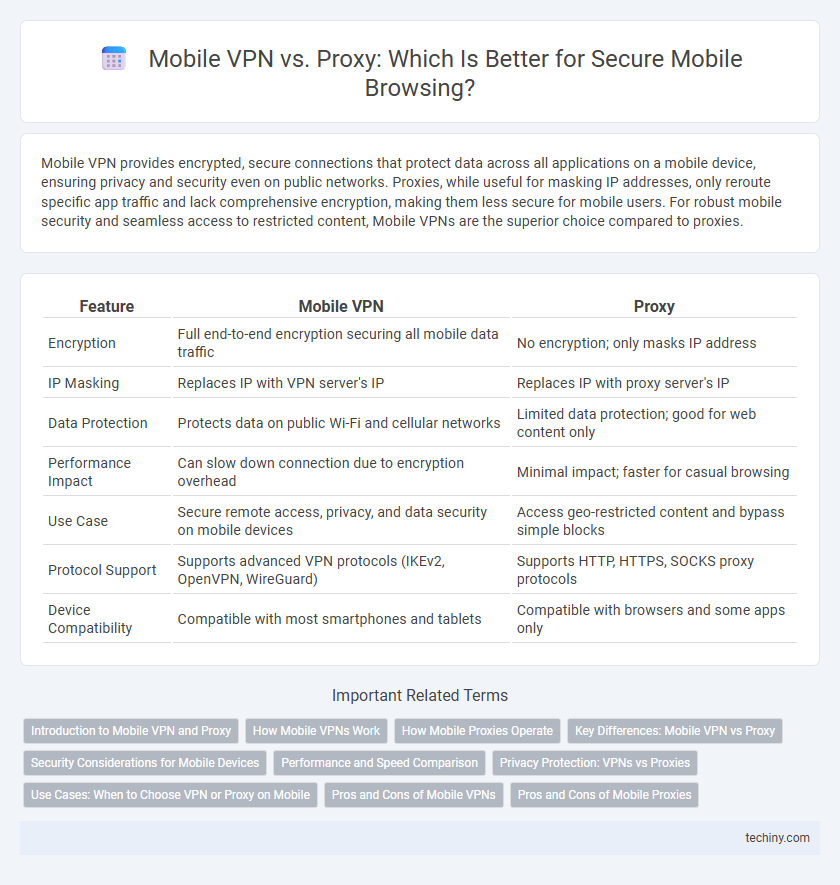Mobile VPN provides encrypted, secure connections that protect data across all applications on a mobile device, ensuring privacy and security even on public networks. Proxies, while useful for masking IP addresses, only reroute specific app traffic and lack comprehensive encryption, making them less secure for mobile users. For robust mobile security and seamless access to restricted content, Mobile VPNs are the superior choice compared to proxies.
Table of Comparison
| Feature | Mobile VPN | Proxy |
|---|---|---|
| Encryption | Full end-to-end encryption securing all mobile data traffic | No encryption; only masks IP address |
| IP Masking | Replaces IP with VPN server's IP | Replaces IP with proxy server's IP |
| Data Protection | Protects data on public Wi-Fi and cellular networks | Limited data protection; good for web content only |
| Performance Impact | Can slow down connection due to encryption overhead | Minimal impact; faster for casual browsing |
| Use Case | Secure remote access, privacy, and data security on mobile devices | Access geo-restricted content and bypass simple blocks |
| Protocol Support | Supports advanced VPN protocols (IKEv2, OpenVPN, WireGuard) | Supports HTTP, HTTPS, SOCKS proxy protocols |
| Device Compatibility | Compatible with most smartphones and tablets | Compatible with browsers and some apps only |
Introduction to Mobile VPN and Proxy
Mobile VPNs establish secure, encrypted connections that protect data and ensure privacy when accessing networks on mobile devices, particularly over untrusted Wi-Fi or cellular networks. Proxies act as intermediaries that mask the user's IP address but typically lack encryption, making them less secure for mobile data transmission. Understanding the differences in security protocols and network access methods is crucial for selecting the appropriate solution for mobile connectivity.
How Mobile VPNs Work
Mobile VPNs establish secure, encrypted tunnels between mobile devices and corporate networks, ensuring data confidentiality and integrity during transmission. Unlike proxies that only route specific app traffic, mobile VPNs provide comprehensive protection by encrypting all device traffic and maintaining persistent connectivity even during network switches. By leveraging protocols like IKEv2 and OpenVPN, mobile VPNs dynamically adjust to changing IP addresses, minimizing session interruptions and boosting secure remote access efficiency.
How Mobile Proxies Operate
Mobile proxies operate by routing internet traffic through mobile IP addresses assigned by cellular networks, mimicking real mobile devices to provide authentic access to websites and apps. These proxies leverage mobile carrier infrastructure, dynamically rotating IPs and locations to avoid detection and enhance anonymity for activities like web scraping, ad verification, and geo-targeted content delivery. Unlike traditional proxies, mobile proxies exploit the unique characteristics of mobile networks, such as IPv4/IPv6 pooling and carrier-grade NAT, ensuring seamless connectivity and minimal blocking.
Key Differences: Mobile VPN vs Proxy
Mobile VPN offers encrypted tunnels that secure all device traffic across varied networks, ensuring consistent protection and authentication for mobile users, unlike a Proxy, which typically routes specific application traffic without full device encryption. Mobile VPN maintains persistent connections even during network switches, critical for mobile environments, whereas Proxy services often drop sessions when IP addresses change. Proxies mainly handle HTTP/HTTPS traffic and can be configured for web filtering, but they lack the comprehensive security features and device-level control provided by Mobile VPN solutions.
Security Considerations for Mobile Devices
Mobile VPNs provide end-to-end encryption, securing all data traffic and protecting against cyber threats on public Wi-Fi networks, whereas proxies only route specific app traffic without strong encryption. Mobile devices using VPNs benefit from enhanced privacy and reduced risk of data interception, crucial for safeguarding sensitive information in mobile environments. Proxies may expose mobile users to man-in-the-middle attacks and data leaks due to their limited security features.
Performance and Speed Comparison
Mobile VPNs encrypt data, enhancing security but often causing slight latency due to encryption overhead, which can impact speed during high-bandwidth tasks. Proxies typically offer faster connections by simply routing traffic without encryption, making them ideal for activities requiring quick access but less secure data transmission. Performance varies based on network conditions and device capabilities, with VPNs prioritizing privacy and proxies focusing on speed.
Privacy Protection: VPNs vs Proxies
Mobile VPNs encrypt all data traffic, offering robust privacy protection by masking IP addresses and securing user identities from hackers and ISPs. Proxies only route specific app traffic without encryption, leaving data vulnerable to interception and exposing users to privacy risks. Consequently, VPNs provide superior privacy safeguards for mobile users compared to proxies.
Use Cases: When to Choose VPN or Proxy on Mobile
Mobile VPNs are essential for securing sensitive data and ensuring privacy on public Wi-Fi networks, making them ideal for corporate users and remote workers. Proxies are best suited for lightweight tasks such as geo-blocking bypass or accessing region-specific content without the overhead of encryption. Choose VPNs for comprehensive security and anonymity, while proxies offer speed and simplicity for non-sensitive browsing on mobile devices.
Pros and Cons of Mobile VPNs
Mobile VPNs offer robust encryption and secure access to corporate resources on mobile devices, ensuring data privacy even over unsecured networks. They maintain persistent connections despite changes in network type or signal strength, providing seamless and reliable mobile access without interrupting workflows. However, Mobile VPNs can consume more device resources and may introduce latency compared to proxies, potentially impacting device performance and battery life.
Pros and Cons of Mobile Proxies
Mobile proxies offer enhanced anonymity by routing internet traffic through mobile IP addresses, reducing the risk of detection and blocking compared to static VPN servers. These proxies provide seamless access to geo-restricted content and are highly effective for tasks requiring frequent IP changes, such as web scraping and ad verification. However, mobile proxies may experience slower connection speeds and less encryption security, making them less suitable for confidential data transmission compared to mobile VPNs.
Mobile VPN vs Proxy Infographic

 techiny.com
techiny.com